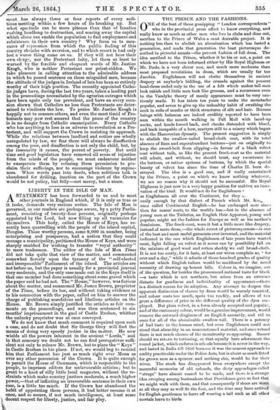LIBERTY IN THE ISLE OF MIN.
ASTATEMENT has been forwarded to us and to most other journals in England which, if it is only as true as it looks, demands very-serious notice. The isle of Man is governed, as our readers are Perhaps aware, by a petty Parlia- ment, consisting of twenty-four persons, originally perhaps appointed by the Lord, but now filling up all vacancies for themselves. This body, called the House of Keys, has re- cently been quarrelling with the people of the island capital, Douglas. Those worthy persons, some 9,000 in number, being enterprising and prosperous, had a notion that they could manage a municipality, petitioned the House of Keys, and were sharply snubbed for wishing to transfer "royal authority" to mere tradesmen. The editor of the Isle of Man Times did not take quite that view of the matter, and commented somewhat fiercely upon the tyranny of the "self-elected and irresponsible" Parliament of the island. The articles are not before us, but the paper is usually for a provincial journal very moderate, and the only case made out in the Keys itself is that one member had done something about some gravel which the paper said he had not. The "House," however, was furious about the matter, and summoned Mr. James Brown, proprietor of the Times, before its bar, and without taking evidence as i to h connection with the paper, called on him to answer the charge of publishing scandalous and libelous articles on the House. Mr. Brown simply justified the articles as fair com- ments on the proceedings, and was then sentenced to six months' imprisonment in the gaol of Castle Rushen, whither the unlucky proprietor was at once conveyed.
We do not know that much comment is required upon such a case, and do not doubt that Sir George Grey will find the means of doing very speedy justice in the matter. He now wields all the powers inherent in the ancient "Lords," and in that armoury we doubt not he can find prerogatives suffi- cient not only to release Mr. Brown, butte place the " Keys" in Castle Rushen in his place. If not, we would beg to remind him that Parliament has just as much right over Mona as over any other possession of the Crown. It is quite enough to permit the House of Commons, which is responsible to the people, to imprison editors for unfavourable articles ; but to grant to a knot of silly little local magnates, without the re- straints which make country justices moderate, a much higher power,—that of inflicting an irreversible sentence in their own case, is a little too much. If the Crown has abandoned the habit of appointing these persons, it had better resume it at once, and so secure, if not much intelligence, at least some decent respect for liberty, justice, and fair play,






























 Previous page
Previous page